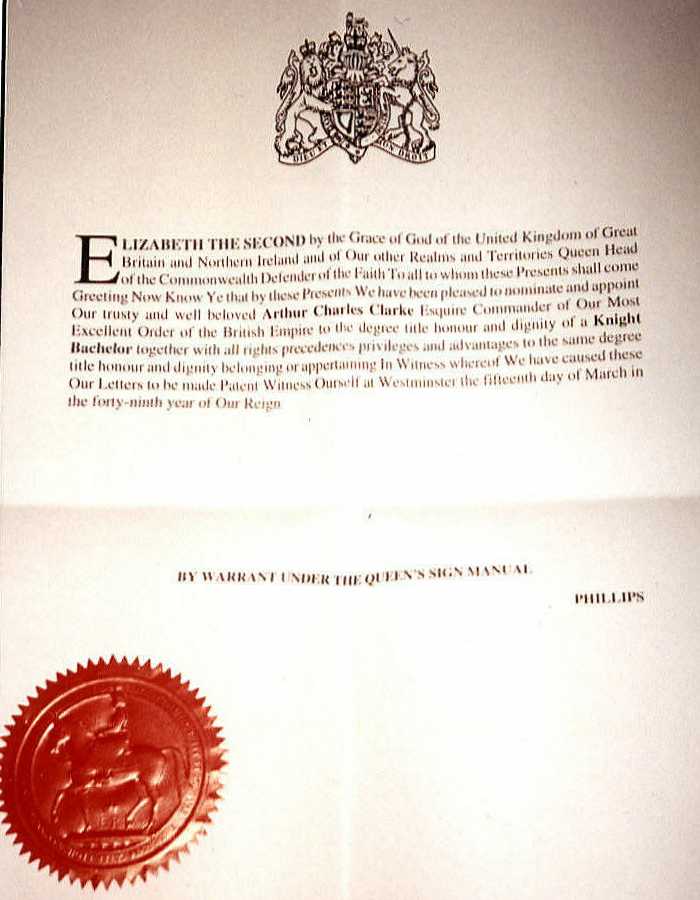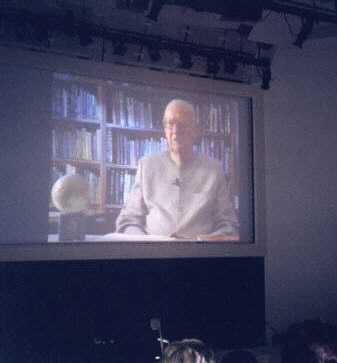Select based on the Speed of connection or download the version required.
Higher speed gives bigger and better resolution image.
The smaller clips below are just individual questions extracts from
Full Video Interview.
|
Kavan - Hello Arthur, I am glad to be able to visit you in Colombo, Sri Lanka,
and thank you very much for agreeing to answer a few question on your
views on Computers and the information technology revolution.
Clarke - Fine . I will answer or evade them as the case may be.
|
| Question 1
|  | 6.35 MB
|
|
Kavan - What effect do you see the accelerating development of information
technology on the gap between rich and poor?
Clarke - Well the gap between the rich and the poor which is enlarging
because of technology. It could be narrowed because equipment is becoming
cheaper and there is no reason why every village in Asia and Africa
shouldn't have at least one little workstation so the people would
come to it. You don't need one in every house or every hut but the
technology should be available, whether it will be or not is another
question depending on politics and economics. But I think technology,
information technology can reduce the gap, but there it depends on us
whether we will use it for that purpose.
|
| Question 2
|  | 4.89 MB
|
|
Kavan - Do you agree that in the internet age information should be
free, with all of its implications concerning intellectual property
and creative work?
Clarke - Well more and more seems to be getting free these days
including telephone calls and the argument about intellectual property
hits me in my pocketbook. If everything was free and you weren't paid
for anything, nobody would do anything. So there has to be some
arrangement for the people who create things should be rewarded in
some way, hopefully not in dot.com stock.
|
| Question 3
|  | 5.53 MB
|
|
Kavan - What nightmare scenarios - if any - do you foresee for the use
of computers?
Clarke - Well I think we are already involved in one nightmare
scenario. I mean how much of one's day is now spent on email. I find
it absorbing more and more of my time. I haven't had it cut into my
sleep yet but I fear that is inevitable. So that's something,
which is already, begin to devour our time. And you know we know
longer have any time to think, to meditate and that's a real
problem. So one tends to react to whatever is happening but we
don't have time to sit back and think, "what should I do?, what the
best thing to do?"
|
| Question 4
|  | 9.12 MB
|
|
Kavan - The promise of technology has often been to lessen the work
load of human beings and provide a life of leisure. However, in many
ways, people are working as hard as if not harder than ever. Do you
think this trend will finally be reversed in the next half-century?
Clarke - I can't see the any reversal but it does seem to be continuing
but it will hit a limit. I mean we can't work more than twenty four
hours a day. I am terrified that some one will invent a drug or
something that will enable us to stay awake permanently. I think that
would be the last information anyone will make. I think we do need
sleep in order to sort out our day's activities retrospectively and to
download the junk that's accumulated in our hard disks during the
day. But information technology and computers enable us to do so much
more but because of that we tend to do much more. I have sometimes
said that far from being labor saving or time saving devices computers
enable us to do ten times as much in twice the time.
|
| Question 5
|  | 8.07 MB
|
|
Kavan - The Time Machine portrays a future where the human
descendants became physically, mentally, and morally diminished
because they no longer found challenges to overcome. Do you see this
scenario as plausible over the next 50 years, or even farther out?
Clarke - Well the Time Machine was Well's masterpiece. I have a signed
portrait of him just above my head at the moment. He imagined the
world dividing these into two species almost. The Feet, creatures who
lived on the surface and were looked after and all their needs were
provided by the workers underground at a terrible cost because they
were eventually eaten by the workers underground. It's a terrifying
scenario and you know ... it could be possible at least ... but it I
think the division will be between humans and robots not two species
of human.
|
| Question 6
|  | 2.99 MB
|
|
Kavan - Until we are technically more capable than we are now, do
you see any bans make sense for the use of information technology?
Clarke - I can see good arguments for trying to impose a ban on certain
areas but I don't think it would be practical because whatever
happens, some ingenious guy in a garage somewhere will do it anyway.
|
| Question 7
|  | 11.53 MB
|
|
Kavan - As mankind evolves through the stages of (a) hunting/gathering,
(b) agriculture, (c) industry, (d) services, (e) information ...
what is the next stage(s) on the horizon? That is, when we have
"exhausted" the information stage, e.g., by Robots with AI doing all the
mental and physical work that we do now, what could come next?
Clarke - Well we can never exhaust information. The universe is
infinite and fast as information content is concerned. In fact, when
we take a tiny little bit of knowledge lets say mathematics and even
other areas, infinite, you can never exhaust that. And the danger of
running out of challenges or interesting things to do but I am afraid
that virtual reality you know, which is going to be the next big thing
and so much more attractive than real life that people just won't make
the effort to these things and just lie back and enjoy inputs into
their brains and that could very well be the end of the human race,
that's an old idea in science fiction of course. And Lawrence
Manning wrote a story again more than fifty years ago called the "City
of Living Dead" which was about this ultimate stage where we are all
the ultimate couch potatoes just plugged in and our computers feed us
everything we want, but then they might get fed up with doing that and
then unplug us and that would serve us right,
|
| Question 8
|  | 4.40 MB
|
|
Kavan - Do you expect that advances in information technology will shed
any light on God and Creator?
Clarke - Well the existence whether God exists or who created us of
course and other fundamental questions and this was summed up in a
famous story I think by Frederick Brown who must be half a century ago
when the ultimate computer is built and they ask him is there a God,
he says " Now there is"
|
|
Clarke - This is Arthur Clarke saying goodbye to my friends.
Kavan - Thank you for this interview.
I hope we will have the opportunity to continue this dialog at a later time.
|
This Inteview was presented at the Carnegie Mellon's School of Computer Science
symposium,
"Earthware:
a good world in 2050 . . . will computers help or hinder?"
Carnegie Mellon University Pittsburgh, USA.
If anyone is willing to download the higher resolution 60MB file and transform
it to other common video formats like .mov .avi etc please let me know a URL
where I can pickup the transfomed video.






